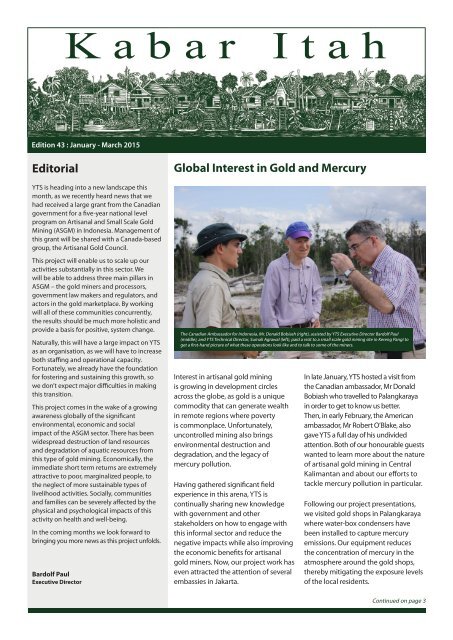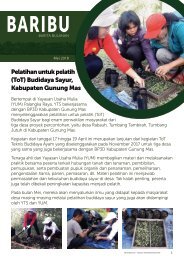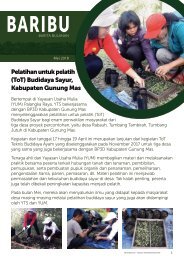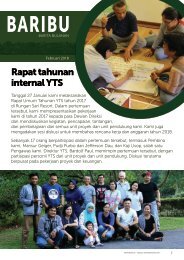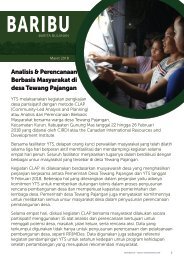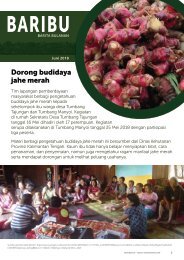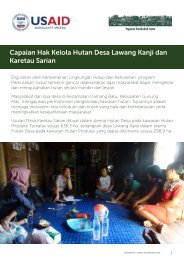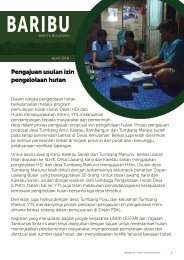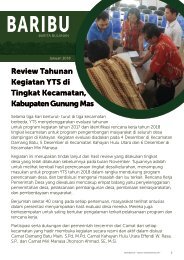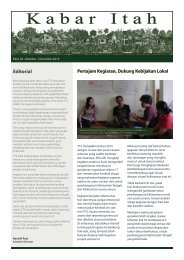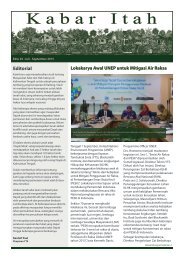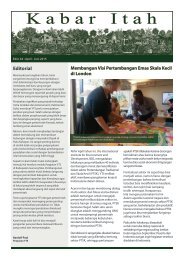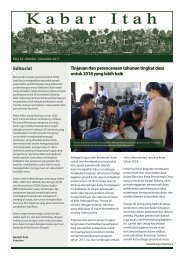150508 KI 43 (E) FINAL HQ
Create successful ePaper yourself
Turn your PDF publications into a flip-book with our unique Google optimized e-Paper software.
K a b a r I t a h<br />
Edition <strong>43</strong> : January - March 2015<br />
Editorial<br />
Global Interest in Gold and Mercury<br />
YTS is heading into a new landscape this<br />
month, as we recently heard news that we<br />
had received a large grant from the Canadian<br />
government for a five-year national level<br />
program on Artisanal and Small Scale Gold<br />
Mining (ASGM) in Indonesia. Management of<br />
this grant will be shared with a Canada-based<br />
group, the Artisanal Gold Council.<br />
This project will enable us to scale up our<br />
activities substantially in this sector. We<br />
will be able to address three main pillars in<br />
ASGM – the gold miners and processors,<br />
government law makers and regulators, and<br />
actors in the gold marketplace. By working<br />
will all of these communities concurrently,<br />
the results should be much more holistic and<br />
provide a basis for positive, system change.<br />
Naturally, this will have a large impact on YTS<br />
as an organisation, as we will have to increase<br />
both staffing and operational capacity.<br />
Fortunately, we already have the foundation<br />
for fostering and sustaining this growth, so<br />
we don’t expect major difficulties in making<br />
this transition.<br />
This project comes in the wake of a growing<br />
awareness globally of the significant<br />
environmental, economic and social<br />
impact of the ASGM sector. There has been<br />
widespread destruction of land resources<br />
and degradation of aquatic resources from<br />
this type of gold mining. Economically, the<br />
immediate short term returns are extremely<br />
attractive to poor, marginalized people, to<br />
the neglect of more sustainable types of<br />
livelihood activities. Socially, communities<br />
and families can be severely affected by the<br />
physical and psychological impacts of this<br />
activity on health and well-being.<br />
In the coming months we look forward to<br />
bringing you more news as this project unfolds.<br />
Bardolf Paul<br />
Executive Director<br />
The Canadian Ambassador for Indonesia, Mr. Donald Bobiash (right), assisted by YTS Executive Director Bardolf Paul<br />
(middle), and YTS Technical Director, Sumali Agrawal (left), paid a visit to a small scale gold mining site in Kereng Pangi to<br />
get a first-hand picture of what these operations look like and to talk to some of the miners.<br />
Interest in artisanal gold mining<br />
is growing in development circles<br />
across the globe, as gold is a unique<br />
commodity that can generate wealth<br />
in remote regions where poverty<br />
is commonplace. Unfortunately,<br />
uncontrolled mining also brings<br />
environmental destruction and<br />
degradation, and the legacy of<br />
mercury pollution.<br />
Having gathered significant field<br />
experience in this arena, YTS is<br />
continually sharing new knowledge<br />
with government and other<br />
stakeholders on how to engage with<br />
this informal sector and reduce the<br />
negative impacts while also improving<br />
the economic benefits for artisanal<br />
gold miners. Now, our project work has<br />
even attracted the attention of several<br />
embassies in Jakarta.<br />
In late January, YTS hosted a visit from<br />
the Canadian ambassador, Mr Donald<br />
Bobiash who travelled to Palangkaraya<br />
in order to get to know us better.<br />
Then, in early February, the American<br />
ambassador, Mr Robert O’Blake, also<br />
gave YTS a full day of his undivided<br />
attention. Both of our honourable guests<br />
wanted to learn more about the nature<br />
of artisanal gold mining in Central<br />
Kalimantan and about our efforts to<br />
tackle mercury pollution in particular.<br />
Following our project presentations,<br />
we visited gold shops in Palangkaraya<br />
where water-box condensers have<br />
been installed to capture mercury<br />
emissions. Our equipment reduces<br />
the concentration of mercury in the<br />
atmosphere around the gold shops,<br />
thereby mitigating the exposure levels<br />
of the local residents.<br />
Continued on page 3
New Image for Gunung Mas<br />
Three years of working to promote the indicative budget<br />
ceiling makes Aprianto appreciate what it means to build<br />
capacity for better development<br />
From the first of<br />
March, YTS will be<br />
working with a<br />
new government<br />
structure in<br />
Gunung Mas.<br />
Many of the<br />
officials we have<br />
been working<br />
with have been<br />
transferred to other<br />
offices, replaced<br />
by new ones from<br />
other departments.<br />
Such changes bring new challenges, as our governance<br />
project in Gunung Mas must constantly build and maintain<br />
relationships with key government officials. Another<br />
challenge is how to build capacity within the new team.<br />
Sudden replacements happen frequently in government,<br />
and it is very important for us to get full support from all of<br />
the strategic duty-bearers when these sudden changes take<br />
place, so that we can continue our project smoothly.<br />
Aprianto, the Section Head of the Economic, Social and<br />
Cultural Planning Board, was our first counterpart when we<br />
commenced our Governance Project in 2011. He has tirelessly<br />
supported our programs and promoted our initiatives to<br />
other stakeholders in Gunung Mas. During the Subdistrict<br />
Musrenbang, he responded to a question about the SIBC<br />
initiative as follows:<br />
“It took three years to convince the other departments to<br />
sign the Subdistrict Indicative Budget Ceiling (SIBC) Policy.<br />
It was not easy, as the government has a very strict and slow<br />
decision-making process. It was only possible once all of the<br />
government agencies came to understand the importance of<br />
village development in the district. I was in a good position to<br />
support the initiative and to make sure it would be of benefit<br />
to the villages. YTS has been conducting a lot of capacity<br />
building events for us (with support from Ford Foundation) so<br />
we shouldn’t miss the opportunity to learn about providing<br />
better programs and services to the communities, so we can<br />
continue to do so independently in future”.<br />
Kanarakan Rejects Musrenbang<br />
null and void. In an<br />
unprecedented form<br />
of protest, the village<br />
rejected all further<br />
government assistance<br />
until action is taken<br />
on their long-standing<br />
proposal to connect<br />
Kanarakan to town<br />
by road.<br />
Until now, despite its close proximity to the<br />
provincial capital, villagers in Kanarakan only<br />
have access to the river for transportation<br />
outside of the village.<br />
Getting to Kanarakan takes two hours by boat. The lack of<br />
road access is the main source of discontent in the village.<br />
It took over an hour to get there by boat, but this year’s<br />
Musrenbang planning event only lasted half an hour, as<br />
the village delegation declared the entire process to be<br />
This is the first time that<br />
any village has rejected<br />
the government’s<br />
development planning<br />
process in Bukit Batu.<br />
Evidently, the frustration<br />
runs deep as the<br />
village maintained<br />
this standpoint at the<br />
subdistrict and district<br />
events too. Although the request for a road goes back twenty<br />
years, the village is prepared to wait until the government<br />
responds to their official challenge, hoping for an answer<br />
to their stated need, rather than another program designed<br />
behind a desk.<br />
2<br />
Kabar Itah - Edition <strong>43</strong>
Participation Grows in Gunung Mas<br />
This year, YTS managed to monitor the Musrenbang planning<br />
process across eight sub-districts in Gunung Mas. The<br />
delivery of the village-based events was markedly better<br />
than in previous years, as the government spent far more<br />
time interacting with the community. We witnessed dynamic<br />
exchanges taking place, as village delegations spoke up<br />
confidently, and defended their proposals. The government<br />
representatives also spoke up, providing direct feedback<br />
about the current status of individual proposals from<br />
previous years. Many of the village delegates expressed a<br />
sense of satisfaction with the process.<br />
Some of these improvements in the quality of the<br />
Musrenbang can be attributed to the efforts that YTS is<br />
making through its governance program in Gunung Mas.<br />
Indeed, prior to these events, YTS assisted with a briefing to<br />
all subdistricts in Gunung Mas regarding the implementation<br />
of the 2015 Musrenbang which included sharing information<br />
on the 2016 Subdistrict Budget Indicative Ceiling. These<br />
positive responses from the community may indicate that our<br />
capacity building efforts are now beginning to show results.<br />
The village delegations from Rungan Barat (left) and Manuhing Raya (right) were taking the opportunity to speak up eagerly for their proposals in the subdistrict Musrenbang<br />
Karli, the head of Putat Durei Village looks forward to<br />
the Musrenbang event next year<br />
“I am pleased with<br />
the process this year,<br />
as the event was<br />
neither as formal<br />
nor as hurried as last<br />
year, and they took<br />
the time to explain<br />
the status of our<br />
previous proposals<br />
to us. I will gladly<br />
join in again next<br />
year, as we got<br />
the opportunity<br />
to express our<br />
aspirations through<br />
our new proposals.”<br />
The Secretary of Manuhing Raya Subdistrict, Simpun,<br />
finds this year’s Musrenbang is more open to<br />
community’s aspiration<br />
“This year, the<br />
Goverment<br />
Agencies were<br />
more thorough in<br />
responding to our<br />
proposals. Last year,<br />
it only lasted half<br />
a day and we had<br />
no opportunity to<br />
speak. This year,<br />
it was a full day<br />
event and we had<br />
much more time to<br />
speak up.”<br />
Global Interest in Gold and Mercury<br />
Continued from page 1<br />
Next, we travelled to the goldfields of Hampalit, in the<br />
district of Katingan, to see the impact that alluvial mining<br />
is having on the forest landscape there. This was the site of<br />
our project activities in 2006-2007 during the UNIDO Global<br />
Mercury Project. The ambassadors left with a much better<br />
understanding of the practical approaches that YTS is taking to<br />
educate and empower the artisanal gold mining community to<br />
reduce and eliminate mercury use here in Central Kalimantan.<br />
Kabar Itah - Edition <strong>43</strong> 3
News Flash<br />
Denmark Training<br />
Danida provides excellent training opportunities to its partner<br />
organizations through its fellowship program. YTS recently took advantage<br />
of a course entitled ‘Sustainable Use and Valuation of Natural Resources’<br />
held over two weeks in Copenhagen, Denmark. It offered insights into<br />
many aspects of community engagement and benefit-sharing from the<br />
global mining industry.<br />
Learning the Company Perspective on CSR<br />
In Jakarta, 35 people took part in the regular HBRI meeting that took<br />
place in January. YTS joined various companies and government<br />
organizations learning from a case study regarding a community-based<br />
health and nutrition program in Yogyakarta. From this, we learned that<br />
most companies generally prefer to run short-term CSR projects, and<br />
realize that it takes a long time to build a truly sustainable program that<br />
will benefit a local community in the long run.<br />
Exploring the Potential for an Indonesia-Canada Collaboration<br />
In February, YTS joined representatives of Indonesia and Canada at a<br />
meeting held by the Ministry of Energy and Mineral Resources in Jakarta.<br />
The meeting aimed to find ways for both governments to collaborate<br />
to better manage the mining sector, by combining the social dimension<br />
with the technical and economic dimensions. The meeting followed<br />
on from a highly successful Indonesian government visit to Canada<br />
last September during which staff from the Corruption Eradication<br />
Committee (KPK) studied some of the measures Canada has put in place<br />
to prevent corruption and promote good governance in the extractives<br />
sector. During the meeting, there were various presentations on Mining<br />
Sector Reform. In one of these presentations, a startling statistic showed<br />
illegal exports to China to be five times higher than officially recorded<br />
and equivalent to five of Canada’s largest West Coast coal ports.<br />
Sanitation Study in Tumbang Mayangan<br />
In Gunung Mas, YTS assisted the district health agency to monitor the<br />
results of a Community Led Total Sanitation (CLTS) event performed in<br />
2014 in the village of Tumbang Tambirah. The purpose was to examine<br />
the extent to which the event had been successful in ‘triggering’ the<br />
community into taking action on better village sanitation. The team also<br />
went to the neighbouring village of Tumbang Manyangan, as it had taken<br />
the initiative to ask YTS for assistance with a CLTS program of its own. The<br />
team was interested to get a commitment from the village and to further<br />
identify their community health needs.<br />
Meeting with Ministry of Environment<br />
and Forestry<br />
On March 12th, YTS joined a meeting held in Jakarta<br />
between the Danida Environmental Support Programme<br />
(ESP3), the Ministry of Environment and Forestry<br />
(KLHK), and the Ministry of Energy and Mineral<br />
Resources (ESDM). Having conducted a Feasibility<br />
Study on Artisanal Small Scale Gold Mining in Wonogiri<br />
in 2014, YTS was able to discuss the results and<br />
recommendations. Danida ESP3 also presented their<br />
follow-up plans for the Wonogiri project.<br />
April<br />
Kahayan Project & Governance Project<br />
Review on Village Development Plan Documents (RPJMDes)<br />
Training: Finalisation of SKPD’s workplan<br />
Technical Assistance (TA): Policy Design for Musrenbang &<br />
Village Election<br />
Bukit Batu Project<br />
Training for Village Management Groups (VMG)<br />
Training for KUB (Kelompok Usaha Bersama)<br />
Artisanal Small-Scale Gold Mining (ASGM)<br />
Field investigation in South Kalimantan<br />
May<br />
Kahayan Project & Governance Project<br />
Training for the Subdistrict Leaders (Camat)<br />
Visit to SKPD (Government Agencies)<br />
TA: capacity buiding for Village Government<br />
Bukit Batu Project<br />
Technical Training on Fish Breeding<br />
Facilitating KUB & VMG to write proposals to government<br />
Artisanal Small-Scale Gold Mining (ASGM)<br />
Field investigation in South Kalimantan<br />
June<br />
Agenda<br />
Kahayan Project & Governance Project<br />
Study Visit with SKPDs<br />
Monitoring CLTS – ODF in Tb. Tambirah<br />
TA for Village Government on writing proposal and computer skills<br />
Bukit Batu Project<br />
Technical Training on maintenance of fingerlings<br />
Facilitating KUB & VMG to write proposals to government<br />
Artisanal Small-Scale Gold Mining (ASGM)<br />
Field investigation in South Kalimantan<br />
Environmental Event at US Embassy<br />
Related to the visit of the US Ambassador, Robert O. Blake, YTS was<br />
invited to an @America event in March entitled ‘Dangerous Mercury:<br />
Creative Solutions to Reduce Its Use in Small Scale Mining’. The US<br />
Embassy Jakarta initiated this event, to show their growing concern on<br />
environmental issues in Indonesia. Presentations from the Ministry of<br />
Energy and Mineral Resources and BPPT, were followed by those of our<br />
partners: Danida and the Blacksmith Institute.<br />
Kabar Itah<br />
Kabar Itah is the quarterly newsletter of Yayasan Tambuhak Sinta (YTS), an affiliate of PT. Kalimantan Surya<br />
Kencana (KSK), a mineral exploration company.<br />
Published by:<br />
Yayasan Tambuhak Sinta<br />
Jl. Rajawali VII, Srikandi III No. 100<br />
Bukit Tunggal Palangka Raya 73112<br />
Kalimantan Tengah-Indonesia<br />
Telp. +62 (0536) 3237184<br />
Fax. +62 (0536) 3229187<br />
Email: tambuhaksinta@gmail.com<br />
Website: www.tambuhaksinta.com<br />
Bank Accounts:<br />
Yayasan Tambuhak Sinta<br />
BNI 1946<br />
Palangka Raya Branch<br />
Central Kalimantan<br />
INDONESIA<br />
Number 0114981608<br />
Swift: BNINIDJA<br />
4<br />
Kabar Itah - Edition <strong>43</strong>


